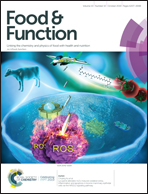Different dietary protein sources in low protein diets regulate colonic microbiota and barrier function in a piglet model†
Abstract
Protein fermentation has an adverse effect on colonic health; high-quality proteins and reducing the protein level (protein restriction) can effectively decrease the amount of proteins flowing into the colon for microbial protein fermentation. The study is aimed at determining the effects of different protein sources on colonic microbial composition and barrier function in nursery pigs with a low protein diet. A total of 264 weaned pigs were randomly divided into 4 dietary groups and each group had 6 pens with 11 pigs. Four low protein, amino acid (AA)-supplemented diets containing either 4% Palbio 50 RD (P50), Soyppt-50% (S50), concentrated degossypolized cottonseed protein (CDCP), or fish meal (FM) were prepared, and all the diets had similar digestible energy (DE), crude protein content (CP, about 18%), and equal amount of standardized ileal digestible (SID) lysine, methionine, tryptophan, and threonine. After 28 days of feeding trial, CDCP decreased the Desulfovibrio abundance but increased the Parabacteroides abundance. S50 elevated the Bacteroides and CF231 abundance. P50 and FM reduced the Clostridium and Ruminococcus abundance. CDCP upregulated the Occludin mRNA expression and tended to increase the amount of mixed neutral-acidic mucins in the colon. FM and CDCP declined the serum DAO and endotoxin contents. S50 and CDCP decreased the levels of serum IL-1α, and P50 lowered the serum IL-8 content. We concluded that plant protein (CDCP and S50) had advantages over animal protein (P50 and FM) in maintaining the colonic health via the regulation of colonic microbiota and barrier function.



 Please wait while we load your content...
Please wait while we load your content...